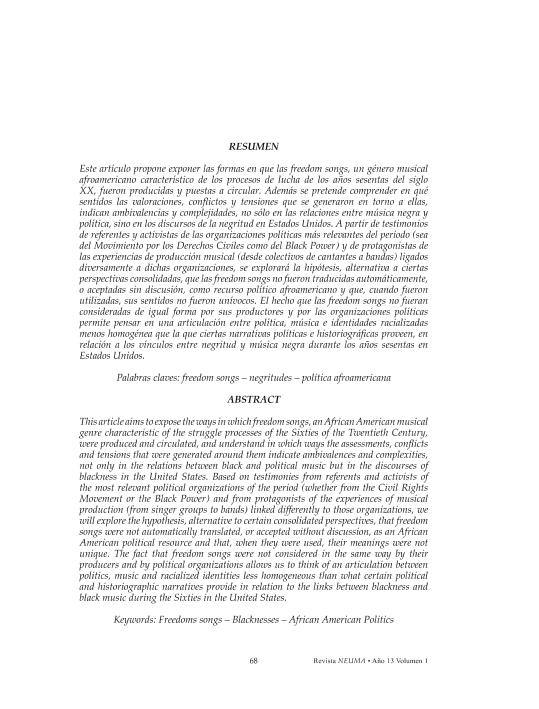Artículo
Este artículo propone exponer las formas en que las freedom songs, un género musical afroamericano característico de los procesos de lucha de los años sesentas del siglo XX, fueron producidas y puestas a circular. Además se pretende comprender en qué sentidos las valoraciones, conflictos y tensiones que se generaron en torno a ellas, indican ambivalencias y complejidades, no sólo en las relaciones entre música negra y política, sino en los discursos de la negritud en Estados Unidos. A partir de testimonios de referentes y activistas de las organizaciones políticas más relevantes del período (sea del Movimiento por los Derechos Civiles como del Black Power) y de protagonistas de las experiencias de producción musical (desde colectivos de cantantes a bandas) ligados diversamente a dichas organizaciones, se explorará la hipótesis, alternativa a ciertas perspectivas consolidadas, que las freedom songs no fueron traducidas automáticamente, o aceptadas sin discusión, como recurso político afroamericano y que, cuando fueron utilizadas, sus sentidos no fueron unívocos. El hecho que las freedom songs no fueran consideradas de igual forma por sus productores y por las organizaciones políticas permite pensar en una articulación entre política, música e identidades racializadas menos homogénea que la que ciertas narrativas políticas e historiográficas proveen, en relación a los vínculos entre negritud y música negra durante los años sesentas en Estados Unidos. This article aims to expose the ways in which freedom songs, an African American musical genre characteristic of the struggle processes of the Sixties of the Twentieth Century, were produced and circulated, and understand in which ways the assessments, conflicts and tensions that were generated around them indicate ambivalences and complexities, not only in the relations between black and political music but in the discourses of blackness in the United States. Based on testimonies from referents and activists of the most relevant political organizations of the period (whether from the Civil Rights Movement or the Black Power) and from protagonists of the experiences of musical production (from singer groups to bands) linked differently to those organizations, we will explore the hypothesis, alternative to certain consolidated perspectives, that freedom songs were not automatically translated, or accepted without discussion, as an African American political resource and that, when they were used, their meanings were not unique. The fact that freedom songs were not considered in the same way by their producers and by political organizations allows us to think of an articulation between politics, music and racialized identities less homogeneous than what certain political and historiographic narratives provide in relation to the links between blackness and black music during the Sixties in the United States.
"Una canción puede cambiar tu condición" las freedom songs como materia de aglutinamientos y tensiones en torno a los sentidos de la negritud en la política afroamericana: Estados Unidos 1955-1971
Título:
“Song can change your condition” freedom songs as a matter of agglutinations and tensions around the meanings of blackness in african american politics: United States 1955-1971
Fecha de publicación:
01/06/2020
Editorial:
Universidad de Talca
Revista:
Neuma
ISSN:
0719-5389
e-ISSN:
0718-7017
Idioma:
Español
Tipo de recurso:
Artículo publicado
Clasificación temática:
Resumen
Palabras clave:
FREEDOM SONGS
,
NEGRITUDES
,
POLÍTICA AFROAMERICANA
Archivos asociados
Licencia
Identificadores
Colecciones
Articulos(CCT - ROSARIO)
Articulos de CTRO.CIENTIFICO TECNOL.CONICET - ROSARIO
Articulos de CTRO.CIENTIFICO TECNOL.CONICET - ROSARIO
Citación
Gatto, Ezequiel Guillermo; "Una canción puede cambiar tu condición" las freedom songs como materia de aglutinamientos y tensiones en torno a los sentidos de la negritud en la política afroamericana: Estados Unidos 1955-1971; Universidad de Talca; Neuma; 13; 1; 1-6-2020; 68-111
Compartir
Altmétricas




